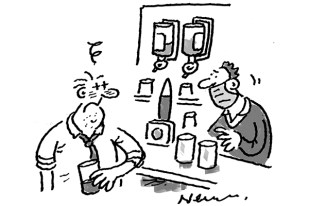Work your hands from day to day, the winds will blow the profit.
The glass is falling by the hour, the glass will fall forever,
But if you break the bloody glass, you won’t hold up the weather.’
The first poem I ever heard was ‘Eenie, meenie, minie moe, catch a tiger by the toe. If he hollers, let him go’, etc. I found it mystifying. How would one catch a tiger by its toe? And do tigers ‘holler’? ‘There is something about this poem they’re not telling me,’ I thought, full of worry, my nappy beginning to chafe. This was last week, by the way. (Ha. Only kidding.)

The second poem concerned the rather humdrum and repetitive activities of a spider attempting to climb up some sort of drain, and its setbacks occasioned by inclement weather. I can’t say that these rhymes commended poetry to me. I would have been better off with something more relevant to my situation as a recently weaned infant living in an unjust patriarchal society, instead of tall stories about misguided tiger-hunting expeditions and dreary Sisyphean arachnids.
This stuff occurred to me lately because I have been teaching my 14-year-old daughter about poetry. It’s all part of my ‘Smash the Teachers’ alternative syllabus for lockdown — which has also recently involved a module entitled ‘How the British Empire Brought Decency, Democracy and Wealth to a Billion Grateful Natives’. Her papier-mâché bust of Sir Cecil Rhodes is coming along fine and I am looking forward to her essay ‘-Exploding Three Modern Myths — the Gender Pay Gap, Structural Racism and the Climate Catastrophe’. I see it all as a counter–balance to the stuff she is taught when the teaching staff have bothered to turn up to school. A different perspective. So it is with the poetry, given that her official exposure to it has so far consisted mainly of rap. Nothing against rap — I’m just not sure that’s all there is, bruv.
As part of my ‘Smash the Teachers’ alternative lockdown syllabus, I’m teaching my daughter about poetry
We began with Charles Causley and John Betjeman — a gentle start, stuff that rhymes and has a familiar metre. Less sentimental than me, she found Causley ‘irritating’ and ‘Cornish’ — even the beautiful ‘On Eden Rock’, which he wrote shortly before he died and which should bring a tear to the eye of even a teenage trainee psychopath. She warmed to Betjeman’s snide nastiness in ‘Slough’ and ‘In Westminster Abbey’ though — and came to the perfectly reasonable conclusion that he ‘didn’t like modern things very much’.
In week two we went back a couple more decades but, paradoxically you might think, the poetry got more modernist with the ‘pansy pin’ (Orwell’s description, not mine) McSpaunday set: MacNeice, Spender, Auden and C. Day Lewis. I suppose most buffs would have concentrated on Auden from that collection — and we did amble through ‘Stop all the clocks’ etc. But Louis MacNeice was always the one for me, and I was in charge. So we did ‘Bagpipe Music’ — and here’s the thing. These long dead wordsmiths, with their unpalatable baggage, marooned in that increasingly distant country, the past, are not read much in English literature lessons because they lack that ‘relevance’ I mentioned above. Whatever can be gleaned from their verses is at least partially obscured by the stuff of their age, references which a child should not be expected to understand. And yet that is one of the greatest pleasures of MacNeice’s rollicking ballad: explain the obscure (to my daughter) references and the past suddenly opens up with a fullness, a richness, which kids these days — studying history always through the perpetual tyranny of Now — normally could not dream of.
And so once I had told her what was meant by the ‘Herring Board’, ‘crêpe-de-chine’, ‘peepshow’, ‘bit of skirt’, ‘sugar-stick’ and ‘Blavatsky’ (this last basically a Russian fin de siècle Greta Thunberg), the words fell into place. The Great Depression suddenly came into view, with the horrible chasm between rich and poor, the enforced and sometimes not enforced idleness, a new war looming in the near distance. The concerns of ‘Bagpipe Music’ are not terribly different to those we have now, of course — something she picked up very quickly, scenting a familiarity she had not expected. But that’s the point, really. To understand the past you need to actually inhabit it for a while, something we seem increasingly incapable of doing.
Today the past is seen by this woke generation — and its imbecilic squadron leaders in academia — as an irredeemably bad place, something to be excised from the mind, to be written off and if mentioned at all, then castigated. And yet the past is far more complex than that, multilayered and ambiguous, and not everything which happened in it deserves to be obliterated, rewritten. MacNeice then took us into the second world war with a lovely minor poem, ‘Swing Song’: ‘I’m only a wartime working girl/ The machine shop makes me deaf/ I have no prospects after the war/ And my young man is in the RAF/ K for Kitty calling P for Prue/ Bomb doors open, over to you.’
This weekend, maybe as you’re reading this, our little poetry class gets more modernist still — by going back further in time. Yes, this Saturday it’s T. S. Eliot and ‘The Love Song of J. Alfred Prufrock’. Wish me luck with that one – the first poem she’ll have been given that I can’t recite entirely by heart. I grow old, I grow old. But annoyingly it is the top of my trousers which I wear rolled, not the bottoms. I am just hoping that the teachers continue to refuse to do anything as tiresome as work for long enough for me to introduce her to John Keats and my favourite poem from adolescence, ‘La Belle Dame sans Merci’. I hope she will ask me what exactly is going on in that ‘elfin grot’. My reply will be succinct: ‘He gave her one in a cave, love.’







Comments